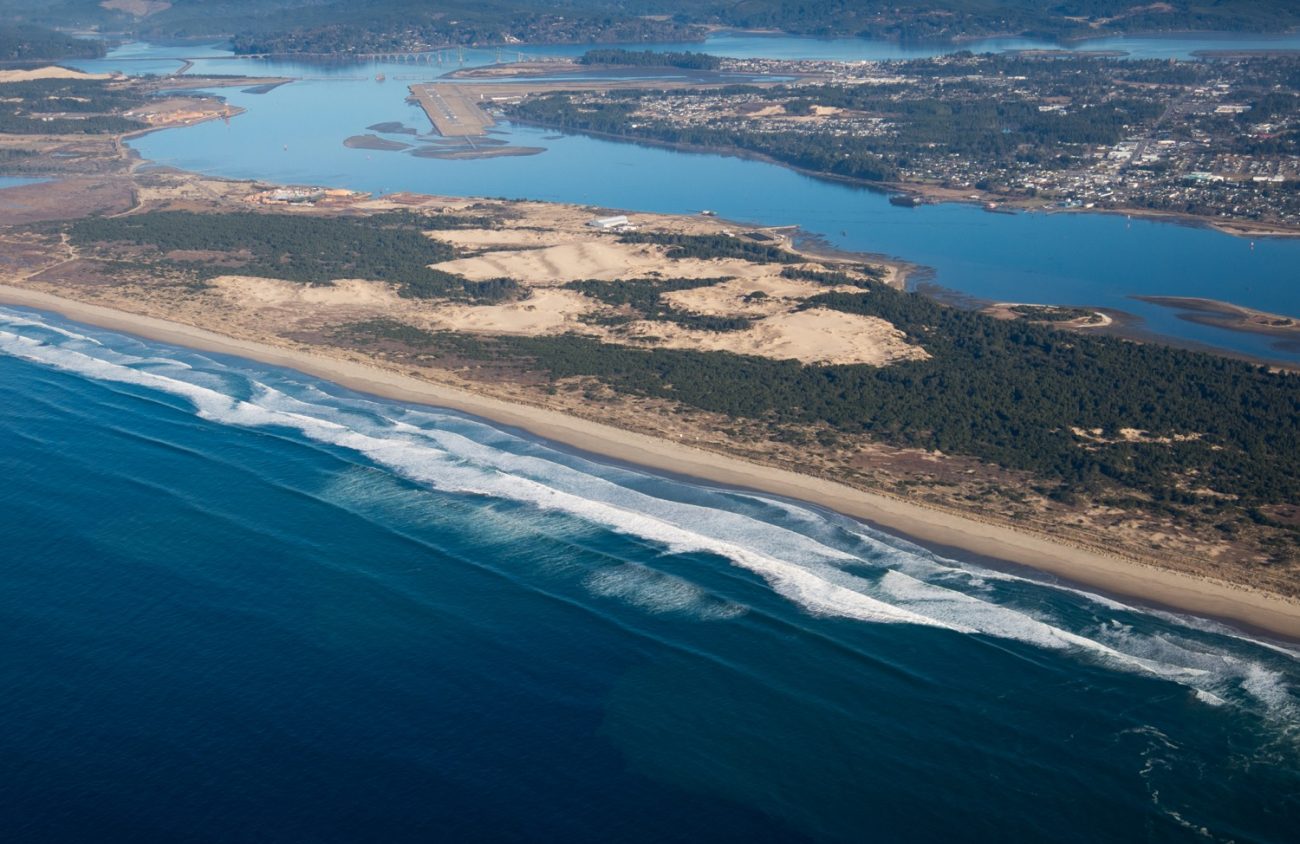A recent decision from the Oregon Land Use Board of Appeals (LUBA) may create significant barriers for a proposed liquefied natural gas (LNG) export terminal in Coos Bay. Activists say the decision is just “one battle in a long war,” but they hope the roadblocks it creates will prevent the proposed Jordan Cove LNG export terminal from coming to fruition.
The Jordan Cove Project includes an export terminal and the 233-mile, 36-inch-wide Pacific Connector Pipeline LNG pipeline carrying fracked natural gas that would cross 400 streams and waterways, including the Klamath and Rogue rivers, and go under the Coos Bay estuary.
“LUBA found in our favor in almost every point in our appeal of Coos County’s approval of the land use permit,” says Phillip Johnson, the executive director of Oregon Shores Conservation Coalition. Oregon Shores led the petition to repeal Coos County’s approval, but numerous other parties also intervened as petitioners, most notably the Confederated Tribes of Coos, Lower Umpqua and Siuslaw Indians.
LUBA agreed with Oregon Shores in whole or in part on six out of seven arguments the group brought. “Most of the arguments that were found to be adequate that Oregon Shores raised had to do with impacts to the estuaries,” including the toxic effects of dredging, says Courtney Johnson, a staff attorney for Crag Law Center, who represented Oregon Shores in the appeal (no relation to Phillip Johnson).
“Oregon and Coos County land use laws contain protections for estuaries, wetlands and shore lands within Coos Bay, and LUBA’s decision reinforced that those provisions have significant meaning and can’t be brushed aside to ignore adverse impacts to those resources,” she says.
LUBA sent a previous version of the Jordan Cove plan back to the county for consideration. It had already been denied by the Federal Energy Regulatory Commission last year. But both Jordan Cove and Oregon Shores continued with the appeals process, seeking a decision that would set a precedent for future versions of the project.
When asked to comment, Jordan Cove LNG sent a press release to Eugene Weekly quoting Betsy Spomer, president of Jordan Cove: “For a large-scale development project such as Jordan Cove, the requirement to remedy minor portions of the LUBA permit is common and not unexpected.”
Oregon Shores’ Phillip Johnson says the decision is a clear indicator that Jordan Cove and Coos County will face big hurdles when pushing through a new land use application to go with Jordan Cove’s new proposal.
There’s a precedent for land use obstacles preventing LNG pipelines from being constructed in Oregon, according to Crag’s Courtney Johnson.
“We’ve also seen two other similar projects in Oregon, the Bradwood Landing LNG project and the Oregon LNG project at Warrenton, and both failed under the local land use review,” she says. “So this is certainly not the end of the fight, but this decision could have real relevance and impact, and it certainly gives those who are concerned about this project a shot of life and hope that we’re going to continue this fight.”
Phillip Johnson says the project has many opponents in the area of the port and the pipeline. “It’ll cross people’s land and interfere with what they want to do with their land,” he says. Johnson points out that though the pipeline will bring jobs to Coos Bay during construction, the jobs that remain afterwards will be very specialized. “We’re pretty sure most of those jobs will go to outsiders with technical abilities and not to locals,” he says.
The project may also interfere with local jobs that already exist, Phillip Johnson adds. “There’s also concern about the local fishing industry because LNG tankers have a 500-yard buffer zone around them where no ship can transit.”
This was one of the arguments that LUBA agreed with in its decision to force a new consideration by the county. “Oregon Shores argues that, because portions of the estuary are less than 1,000 yards wide, each tanker passage will completely halt navigation, fishing and commercial uses of those portions of the estuary until the LNG tanker passes,” the LUBA decision reads.
“That is this large area of the waterway into which essentially no other vessels could enter,” Courtney Johnson says. “This is especially important for the commercial and recreational fisheries in Coos Bay.”
She adds, “It’s important for people to know that it’s not just a couple of enviro groups that are opposed to this,” pointing to numerous opposition groups, including the local airport, landowners, fisheries and the tribes. The tribes succeeded in their argument on the basis that the county failed to adequately include them in the decision-making process, despite a 2015 designation of Jordan Cove as a “significant” archeological site.
